| | | |
Archive
| « March 2026 » |
|---|
| Mo | Tu | We | Th | Fr | Sa | Su |
|---|
| | 1 | | 2 | 3 | 4 | 5 | 6 | 7 | 8 | | 9 | 10 | 11 | 12 | 13 | 14 | 15 | | 16 | 17 | 18 | 19 | 20 | 21 | 22 | | 23 | 24 | 25 | 26 | 27 | 28 | 29 | | 30 | 31 | |
|
| | | |
|
|
|
|
|
|
|
28 November 2011 | Views: 4722 | Comments: 0 |
|
|
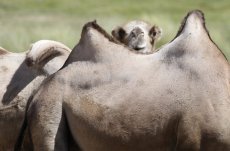 One of the first depictions of this imperial animals on Tuvan territory was found by archeologists in the district of Upper Yenisei. An ancient artist engraved the drawing of a camel already in the first century before our era. One of the first depictions of this imperial animals on Tuvan territory was found by archeologists in the district of Upper Yenisei. An ancient artist engraved the drawing of a camel already in the first century before our era.
The camel - "teve" - is mentioned many times in Tuvan folk epics, where the animal is compared to the hero-warrior, whose nostrils spout smoke, and whose step shakes and crumbles mountains. There have always been camels in Tuva. Nevertheless, they remain, and probably will remain exotic even for Tuvan residents for many years to come.
|
|
|
|
|
|
Galina Murygina, Tuvinskaya pravda, translated by Heda Jindrak |
|
|
|
|
|
|
|
|
23 November 2011 | Views: 5505 | Comments: 0 |
|
|
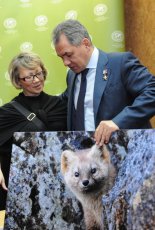 A presentation of photo-album "Black and White Tuva. Unfinished history…", which was published on the initiative of Sergei Shoigu with the support of Russian Geographic Society, took place at the National Museum of Tuva. The event had additional ceremonial aura because of the presence of artists from the National theatre of Music and Drama in historical costumes; Kaigal-ool Khovalyg, National khoomeiji, played the igil. Huge numbers of photographs from personal archives of travelers and residents of Tuva were collected in the album, but the majority belongs to the first director of Tuvan State Museum Vladimir Yermolayev. A presentation of photo-album "Black and White Tuva. Unfinished history…", which was published on the initiative of Sergei Shoigu with the support of Russian Geographic Society, took place at the National Museum of Tuva. The event had additional ceremonial aura because of the presence of artists from the National theatre of Music and Drama in historical costumes; Kaigal-ool Khovalyg, National khoomeiji, played the igil. Huge numbers of photographs from personal archives of travelers and residents of Tuva were collected in the album, but the majority belongs to the first director of Tuvan State Museum Vladimir Yermolayev.
|
|
|
|
|
|
gov.tuva.ru, translated by Heda Jindrak, photo by Vitali Shaifulin |
|
|
|
|
|
|
|
|
19 November 2011 | Views: 3236 | Comments: 0 |
|
|
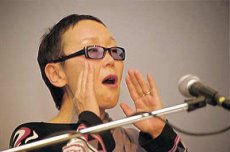 Tuvan singer Sainkho Namtchylak, who has long been living abroad and who conquered world renown, will conduct a throat-singing workshop at the Museum of History of Ulan-Ude on 19-20 November. Tuvan singer Sainkho Namtchylak, who has long been living abroad and who conquered world renown, will conduct a throat-singing workshop at the Museum of History of Ulan-Ude on 19-20 November.
As the government press-service of Buryatia explains, Sainkho Namtchylak, who is a singer-experimenter, improviser, composer, sound-poet, and specialist in archaic singing techniques, vocal techniques of people of Siberia and Far East, represents a unique phenomenon of world vocal culture.
|
|
|
|
|
|
RIA-Sibir, translated by Heda Jindrak |
|
|
|
|
|
|
|
|
18 November 2011 | Views: 4103 | Comments: 0 |
|
|
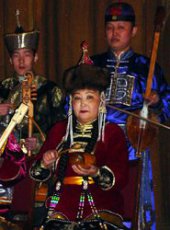 Today, national artist of Russia and Tuva is holding a benefit concert. She is saying good-bye to the State ensemble "Sayany", with whom she worked for many years. Today, national artist of Russia and Tuva is holding a benefit concert. She is saying good-bye to the State ensemble "Sayany", with whom she worked for many years.
Apparently, love for folk song is inherited in mother's milk. The singer's mother, Opal Agban-Shyyrapovna, who is now 81 years old, won the Grand-Prix of festival-contest "Folk Song - 2011".
At the concert, they will together sing a song about their native places.
|
|
|
|
|
|
Tuvinskaya pravda, translated by Heda Jindrak |
|
|
|
|
|
|
|
|
14 November 2011 | Views: 12277 | Comments: 0 |
|
|
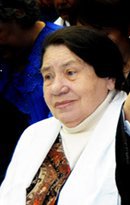 Today in Moscow there is a memorial for Alexandra Yakovlevna Shoigu, whose life has been connected with Tuva and its people for many years. She will be buried at Troyekurovskoye Cemetery next to her husband - Kuzhuget Sergeyevich Shoigu. Many representatives of Tuvan diaspora will be participating in the ceremony, including members of Sergei Shoigu's party and family friends. The head of Tuva, Sholban Kara-ool has been supporting Sergei Kuzhugetovich at this difficult time. Today in Moscow there is a memorial for Alexandra Yakovlevna Shoigu, whose life has been connected with Tuva and its people for many years. She will be buried at Troyekurovskoye Cemetery next to her husband - Kuzhuget Sergeyevich Shoigu. Many representatives of Tuvan diaspora will be participating in the ceremony, including members of Sergei Shoigu's party and family friends. The head of Tuva, Sholban Kara-ool has been supporting Sergei Kuzhugetovich at this difficult time.
|
|
|
|
|
|
gov.tuva.ru, translated by Heda Jindrak |
|
|
|
|
|
|
|
|
5 November 2011 | Views: 3038 | Comments: 0 |
|
|
The Association of the Buddhists of Tuva (OBT) has sent an open letter addressed to Russian Foreign Minister Sergey Lavrov, asking him to grant a Russian entry visa to the Dalai Lama.
The letter, posted on the website of the Center for Tibetan Culture and Information, has been signed by Kamby Lama (the head of Tuvan Buddhists) Nikolay Kuular and OBT administration Chairman Buyan Sandyk. Over the past 20 years, since the only visit by the Dalai Lama to the republic, many temples, prayer houses, stupas and prayer wheels have been erected here, the authors said.
|
|
|
|
|
|
|
|
|
|
|
|
|
31 October 2011 | Views: 11696 | Comments: 0 |
|
|
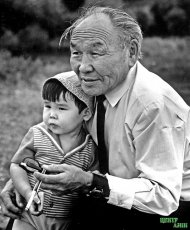 "Life can't be stopped, that means that time can't be stopped either. The saying - a time for everything - is not in vain. It really is like that: everybody is born in his own time and lives in his own times. "Life can't be stopped, that means that time can't be stopped either. The saying - a time for everything - is not in vain. It really is like that: everybody is born in his own time and lives in his own times.
Do we have the right not to respect the past times? Do we have the right to pass judgment on the past?
Do we have the right not to forgive mistakes?
We have no such right. But we do have the right to analyze, to make choices and to prevent repeating mistakes. And mainly - to remember and to keep."
|
|
|
|
|
|
centerasia.ru, translated by Heda Jindrak |
|
|
|
|
|
|
|
|
30 October 2011 | Views: 5240 | Comments: 0 |
|
|
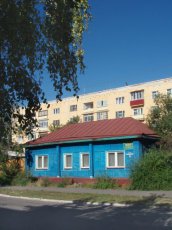 A meeting dedicated to the victims of political repressions was held today by the Monument of the Undefeated Arat in the capital of Tuva. 10-20 meters from the monument, there is a one-story grey wooden building, which today contains a museum of political repressions. Its history is closely related to this tragic page in the history of Tuva. In the basement of this house, by the burning-hot stove, confessions were extracted from the accused. A meeting dedicated to the victims of political repressions was held today by the Monument of the Undefeated Arat in the capital of Tuva. 10-20 meters from the monument, there is a one-story grey wooden building, which today contains a museum of political repressions. Its history is closely related to this tragic page in the history of Tuva. In the basement of this house, by the burning-hot stove, confessions were extracted from the accused.
Altogether, according to the data collected by the scholars, 1036 people were sentenced in Tuva in association with the repressions, and 132 of them were given the maximum punishment. In the neighboring Mongolia, 25785 people were sentenced in 1937-39, out of which 20039 were shot.
|
|
|
|
|
|
Dina Oyun, translated by Heda Jindrak |
|
|
|
|
|
|
|
|
28 October 2011 | Views: 2631 | Comments: 0 |
|
|
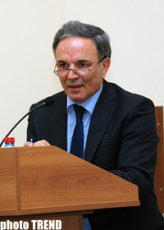 The Coordination Centre of Turkic-speaking media outlets has been formed in Baku today. The Coordination Centre of Turkic-speaking media outlets has been formed in Baku today.
The decision was made at the Second Media Forum of Turkic-Speaking Countries.
The local committees for individual countries and societies were also formed. Chairmen of local committees were automatically elected members of the Coordinating Council.
|
|
|
|
|
|
|
|
|
|
|
|
|
20 October 2011 | Views: 6967 | Comments: 0 |
|
|
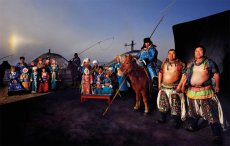 Tuvans in China live in the Altai aimak of Xinjiang -Uighur autonomous region of Chinese People's Republic, in picturesque mountains and steppes of the Altai Mountains. This territory borders in the north with Russia, in the west - Kazakhstan, and east - with Mongolia. Tuvans in China live in the Altai aimak of Xinjiang -Uighur autonomous region of Chinese People's Republic, in picturesque mountains and steppes of the Altai Mountains. This territory borders in the north with Russia, in the west - Kazakhstan, and east - with Mongolia.
Representatives of various ethnic backgrounds mingle in the Altai aimak: Chinese, Kazakhs, Dunkans, Mongols, Uighurs. Many Kazakhs can be counted in the compact Tuvan settlements (Ak-Khaba, Khanas, Khom, Ala-Khaak, Kok-Dogai).
|
|
|
|
|
|
Zhanna Yusha, Tuvinskaya pravda, tuvpravda.ru, translated by Heda Jindrak |
|
|
|
|
|
|
